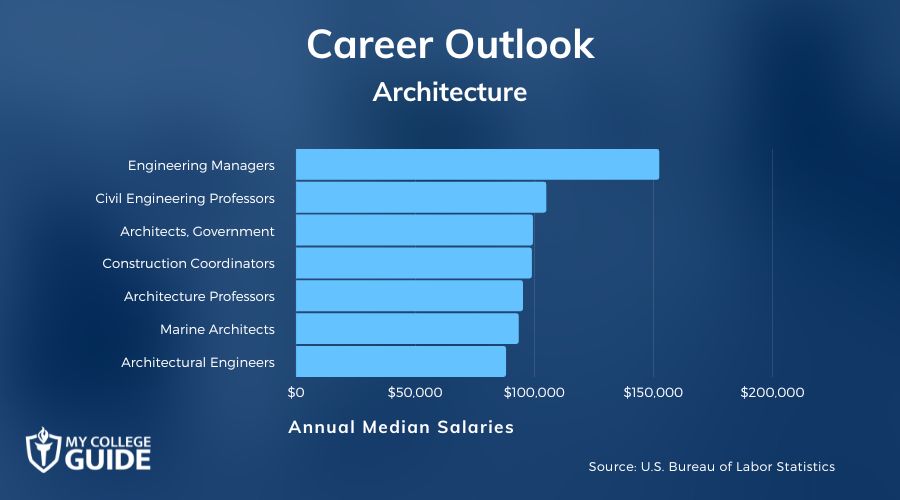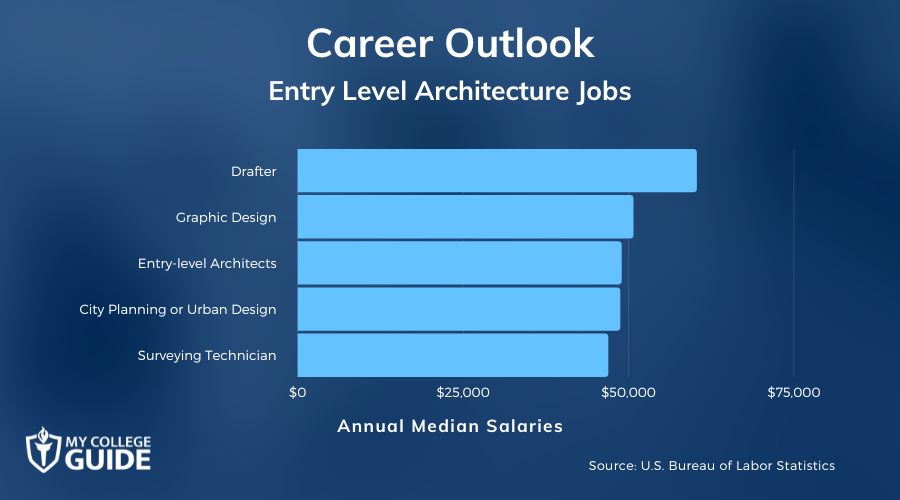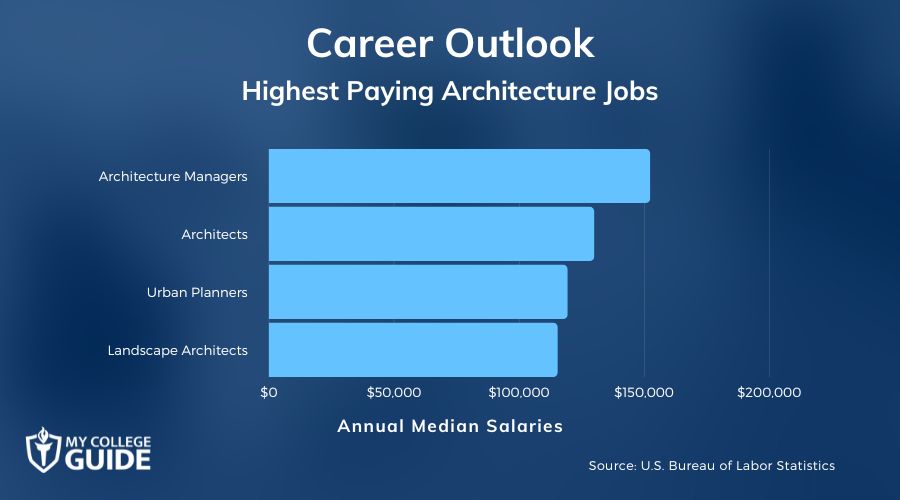For students who graduate with an online architecture degree, there is a world of architecture careers to choose from.

Many architecture degree program graduates go on to become licensed architects, and the skills that you learn can apply to a number of exciting career paths.
Editorial Listing ShortCode:
You can also opt to use your architecture degree in other areas besides becoming a licensed architect, such as becoming a construction manager or interior designer. A degree in architecture can open the door to many opportunities.
What Can You Do With an Architecture Degree?

When wondering what can you do with a degree in architecture, it’s helpful to know that architecture is a versatile field, similar to art careers.
Professional architects may work for independent firms or government organizations to help design structures that include buildings, naval vessels, or outdoor landscapes. If you’d like to take your career ideas in a different direction, advanced architectural skills are highly sought after in industries such as construction, building inspection, or engineering.
Editorial Listing ShortCode:
Becoming a licensed architect is a multi-step process, and most graduates from an architecture program begin their careers in entry-level positions within an architectural firm. After licensing, you may have the opportunity to advance within the field and work your way up to earning top pay within the industry.
10 Things You Can Do with a Degree in Architecture
The architecture field offers an array of exciting job opportunities for people of various educational and experience levels. Data from the Bureau of Labor Statistics show that careers in architecture and engineering have an average annual salary of $79,840.
1. Architectural and Engineering Managers

Education Requirement: Bachelor’s degree
Projected Job Growth: 2%
After accruing five or more years of experience, you might be promoted to an architecture management role. Managers lead architectural projects, coordinate team members and oversee budgets. The job may involve a great deal of responsibility for the success of a project.
According to the Bureau of Labor Statistics, managers in this field earn an average annual salary of $152,350. The job may offer bonuses and other perks as well.
2. Construction Managers

Education Requirement: Bachelor’s degree
Projected Job Growth: 8%
Architecture and construction are closely related, so there may be opportunities for you to move into construction management.
Construction managers oversee building projects. That can include homes, commercial buildings, and bridges. The manager’s responsibilities may include coordinating the costs, timeline, and staff for a project. For this role, there’s an average annual salary of $98,890. 40% of construction managers are self-employed, and others are employed by construction companies.
3. Postsecondary Architecture Teachers

Education Requirement: Master’s degree or doctorate
Projected Job Growth: 1%
College students who want to learn about architecture depend on trained, experienced teachers. Professors present lessons, give assignments, and help students prepare for the workforce.
Many universities expect professors to hold a doctorate, but some smaller schools, such as community colleges, hire instructors with master’s degrees. For this position, there’s an average annual full-time salary of $95,160. Some college instructors teach in addition to holding a different full-time job.
4. Architects

Education Requirement: Bachelor’s degree
Projected Job Growth: 3%
If you’re earning an architecture degree, there’s a good chance that you’re hoping to become an architect. As an architect, you’d design structures to meet your client’s needs and provide building plans to construction teams.
Before you can become licensed as an architect, you’ll need to earn a college degree and complete an extensive internship. For full-time licensed architects, the average annual salary is $80,180.
5. Urban and Regional Planners

Education Requirement: Master’s degree
Projected Job Growth: 4%
Urban and regional planners are responsible for determining the best ways to use or improve the land in an area. To inform their plans, they consider demographic research, building regulations, and community opinions.
Editorial Listing ShortCode:
Some planners focus on specific issues, such as expanding transportation options or preserving historic districts. Working as an urban or regional planner could pay an annual salary of $78,500. Federal government jobs often offer the highest salaries.
6. Industrial Designers

Education Requirement: Bachelor’s degree
Projected Job Growth: 3%
Instead of making plans for large buildings, you could channel your design know-how into a career as an industrial designer. Professionals in that field design products like toys or furniture. Like architects, they may use computer design software to assist with the planning process.
Working as an industrial designer can lead to an average salary of $77,030. Management roles may be available for people with experience.
7. Landscape Architects

Education Requirement: Bachelor’s degree
Projected Job Growth: 0%
Would you prefer to design outdoor spaces instead of structures? If so, you might enjoy a career as a landscape architect.
Parks and school campuses are some of the spaces a landscape architect might design. Important considerations for landscape architects include ecology, drainage, and site use. This job requires licensure as a landscape architect. It can lead to an average annual salary of $67,950.
8. Surveyors

Education Requirement: Bachelor’s degree
Projected Job Growth: 1%
Working as a surveyor involves measuring the earth. This skill is useful for projects like determining property boundaries and making maps.
Construction surveying, which involves taking measurements for building plans, is a subfield that’s particularly relevant to architecture majors. This career requires education, a supervised internship, and licensure. The Bureau of Labor Statistics says that the average annual salary for surveyors is $61,600.
9. Interior Designers

Education Requirement: Bachelor’s degree
Projected Job Growth: 1%
Instead of planning the structure of buildings, interior designers plan their inside appearances. The goal is for the space to be safe, useful, and attractive.
An architect’s knowledge of planning software, building materials, and spatial relationships could be beneficial for this career. Working as an interior designer could command an average annual salary of $60,340. Designers may be self-employed or work for a design or architectural service.
10. Surveying and Mapping Technicians

Education Requirement: High school diploma or associate degree
Projected Job Growth: 4%
Surveying and mapping technicians work alongside surveyors and similar professionals. They may run the equipment, place site markers, or enter data into the software. It’s helpful for technicians to know how to use Geographic Information System (GIS) programs.
Editorial Listing ShortCode:
While a high school diploma is the minimum entry requirement for this field, some employers may prefer an associate degree in architecture. On average, technicians in this field earn $46,910.
Common Types of Architects

Architecture is a diverse field, so there are many different types of architects. You could choose to focus your architecture career on a specific branch of this field.
- Commercial Architects: People who work in commercial architecture design buildings for business use. For example, they might focus on office complexes or corporate headquarters.
- Industrial Architects: The field of industrial architecture involves designing large facilities for industrial use. Factories are a common example. Industrial architects must keep in mind safety needs as well as the space requirements for large machinery.
- Landscape Architects: The focus of landscape architecture is on outdoor spaces, such as parks and the campuses of schools and office complexes. Landscape architects must understand the properties and needs of the various plants that they use in their designs.
- Residential Architects: Professionals who design structures for people to live in are called residential architects. They may design homes for individual clients who want to build new houses, or they might work for builders and developers who plan to establish new neighborhoods.
- Restoration Architects: In restoration architecture, architects are involved in preserving historic buildings or returning them to their original states. Success in this field requires knowledge of history as well as skill as an architect.
There are also many niche branches of architecture, such as sustainable architecture, which focuses on eco-friendliness, and extreme architecture, which is about design for withstanding harsh weather conditions. Other ideas include lighting architecture, urban architecture, and audiovisual entertainment architecture.
Architecture Careers & Salaries

Whether you want to work within an architectural firm or translate your knowledge into real estate or engineering, the possibilities are endless once you have earned your architecture degree.
We have put together a list of the top 40 architecture careers & salaries according to data from the U.S. Bureau of Labor Statistics to help you when considering the various jobs in architecture.
| Careers | Annual Median Salaries |
| Engineering Managers | $152,350 |
| Civil Engineering Professors | $104,940 |
| Architects, Government | $99,330 |
| Construction Coordinators | $98,890 |
| Architecture Professors | $95,160 |
| Marine Architects | $93,370 |
| Architectural Engineers | $88,050 |
| Construction Managers, Residential Building Construction | $84,810 |
| Architects, Construction | $82,800 |
| Agricultural Research Engineers | $82,640 |
| Project Management Specialists, Construction of Buildings | $81,680 |
| Building Architects | $80,180 |
| Urban Planners | $78,500 |
| Assembly Instructions Writers | $78,060 |
| Urban Planning Professors | $77,500 |
| Industrial Designers | $77,030 |
| Excavating Supervisors | $72,010 |
| Landscape Architects | $67,950 |
| Construction Job Cost Estimators | $65,170 |
| Mapping Technicians, Utilities | $63,570 |
| Materials Engineering Technicians | $61,950 |
| Architectural Inspectors | $61,640 |
| Land Surveyors | $61,600 |
| Electrical and Electronics Drafters | $61,510 |
| Property Appraisers and Assessors | $61,340 |
| Architectural Wood Model Makers | $60,780 |
| Architectural Drafters | $60,340 |
| Interior Designers | $60,340 |
| Mechanical Drafters | $60,200 |
| Architectural Drafting Instructor | $59,840 |
| Brickmasons | $59,340 |
| Land Acquisition Managers | $59,230 |
| Structural Engineering Technicians | $58,320 |
| City Planning Aides | $49,720 |
| Grader Operators | $48,360 |
| Building Carpenters | $48,260 |
| Surveying Technicians, Mining, Quarrying, and Oil and Gas Extraction | $47,120 |
| Surveying Technicians | $46,910 |
| Quality Assurance Inspectors | $38,580 |
| Construction Carpenters Helpers | $36,690 |
Much like those seeking accounting careers, skilled architects are always in high demand, and increased regulation and constantly expanding urban regions provide ample career opportunities within the architecture professional field.
While most architecture students go on to become licensed architects, it can be beneficial to research related job fields to find out information on other possible career paths. According to the BLS the architecture career outlook continues to look positive. Architects can expect to see 3% employment growth over the next 10 years while construction managers will enjoy a projected 8% growth over the same time period.
Editorial Listing ShortCode:
For those with a detail-oriented mind and a knack for creative design, on-campus or online architecture degrees can be an excellent way to pursue fast-paced, lucrative careers in art and design, architecture, construction, and more.
Whether you go on to become a licensed architect or translate your skills into a related industry, there is a number of exciting career opportunities for those who have a strong architectural skillset.
How to Know if a Career in Architecture is Right for Me

Architecture can be fulfilling work if it’s a good fit for your interests and abilities. Consider a job in architecture if you:
- Appreciate historic design styles and the work of past architects
- Are interested in technical calculations as well as creative endeavors
- Can commit to several years of college plus a lengthy internship experience
- Enjoy checking out the designs and details of various buildings
- Excel at thinking through problems and coming up with creative solutions
- Like working in a team or collaborating with people
- Have strong computer and software skills
- Know how to juggle multiple demands or responsibilities
- Possess an eye for design
- Want to explore a niche subfield, such as retrofitting, historic preservation or urban development
If you’d prefer to focus more on technical matters and less on creative ones, you might prefer a job in engineering. Other related fields include surveying, graphic design, and interior design.
Architecture Licensure and Certifications

After completing a degree and a three-year internship, architects take the Architect Registration Examination (ARE). After passing that test, they may qualify for state licensure as an architect.
Landscape architects take a different test, the Landscape Architect Registration Examination (LARE), and are licensed specifically as landscape architects. Architecture professionals can specialize by earning additional credentials.
For instance, LEED Green Associate certification is an option for those in sustainable architecture. Some colleges offer graduate certificates in historic preservation.
Is Financial Aid Available?

Yes, you may be able to get financial aid for your architecture studies, especially at the undergraduate level. Undergrads may qualify for government grants and loans from state or federal programs. Grad students are more likely to receive loans than grants.
Editorial Listing ShortCode:
Filling out the Free Application for Federal Student Aid (FAFSA) is an essential step toward securing those funds. Students at all levels may qualify for scholarships, fellowships, or employer tuition contributions. Contact professional associations, local organizations, and your HR department to learn about such opportunities.
What Is an Architecture Degree?

An architecture degree is a degree program that studies the various theories of design while teaching the importance of creating proper layouts for buildings and structures.
Typically, those interested in working in the field of architecture begin with a bachelor’s level degree program. After graduation, many students continue with their education to earn advanced graduate degrees within a specific architectural concentration.
Becoming a licensed architect is a lengthy process that involves successful graduation from an accredited Architecture degree program, extensive training hours, and the passing of a comprehensive examination. It is essential to check into your specific state requirements before committing to an Architecture school to ensure that your program meets the standard for professional licensure in the future.
A few of the specialized courses that you can expect to see during your Architecture education include:
- Building Information Modeling
- Sustainable Strategies
- 2D and 3D Digital Modeling
- Housing and Comprehensive Design
Some schools give students the option of participating in the Architectural Experience Program (AXP) while completing their Architecture education. By doing this, you will be able to work towards earning the experience hours needed to take the Architect Registration Examination (ARE) in a quicker timeframe.
With the advancement of technology, some of the top accredited Architecture schools around the country are now offering online architecture degree programs to provide more flexibility for busy adult students. While these programs typically have a required in-person component, they can still be a great option for students who are balancing career and family obligations with their education.
Is Architecture a Good Career?

Yes, architecture is a good career for many professionals. This line of work can prepare you for a career in which you’ll design things that will last — buildings and other structures that people will use and enjoy every day.
Editorial Listing ShortCode:
Most architects are employed full-time. Although deadlines can be stressful, at other times, architects may work regular office hours. As an architect, you’ll be able to engage your brain in both technical and creative pursuits. If that combination is appealing to you, then architecture might be a good career for you.
What Skills Do You Learn in Architecture?

If you go to school to study architecture, you will develop several skills that are essential for careers in this field. Classroom lessons, assignments, major projects, and practicums may help you acquire and improve on these skills.
- Creative problem-solving
- Modeling
- Project leadership
- Technical software, such as computer-aided design programs
- Trigonometry, geometry, and other math
You may depend on these skills daily once you begin your internship and then start working as a professional architect.
What Degree Do You Need to Be an Architect?

Most careers in architecture require a college degree as well as licensure. Many people begin their architecture careers by earning a bachelor’s degree.
Architecture bachelor’s programs usually last five years. Some people begin with a master’s degree instead, which can take three years. Getting licensed requires a multiyear internship in addition to the degree. You may need to work in a supervised setting for three years before you’ll qualify to take the industry exam and become licensed.
People who want to work in landscape architecture usually pursue a specialized degree, such as a Bachelor of Science in Landscape Architecture.
What Do Architects Do?

Architects are professionals who design buildings and similar structures. Their work may focus on residential, commercial, or industrial buildings.
One of an architect’s responsibilities is to meet with clients to learn about their vision for a project. The architect then turns those requests and ideas into an attractive and functional plan. Models and computer drafting programs can help at this stage.
During the construction part of a project, an architect might stay in touch with the building team to observe the progress, answer questions and resolve issues.
Are Architects in Demand?

Jobs for architects aren’t growing quite as quickly as most jobs in the US. The Bureau of Labor Statistics predicts a 3% growth rate over the next 10 years and about 9,100 job openings each year.
Editorial Listing ShortCode:
It’s not that people will no longer be designing homes and office complexes. Rather, the limited architecture job outlook is tied to the increased role of computer software in building design. Specialization in an in-demand architecture niche could be a positive addition to your resume. For example, sustainability is a key focus area in modern architecture.
Where Do Architects Work?

Becoming a trained and licensed architect could prepare you for work in a variety of settings. Architects may be employed by architectural and design firms who work for a variety of clients, or they might focus their efforts on projects for one specific employer.
Organizations that hire architects include:
- Architecture firms
- Commercial construction companies
- Engineering firms
- Land and real estate development companies
- Residential construction companies
A self-employment is also an option for architecture professionals. Those architects may earn their living doing freelance projects for many different clients.
How Much Do Architects Make?

According to the Bureau of Labor Statistics, most architects make at least $48,930 per year. Some earn more than $129,980 annually.
The average income for this job category is $80,180. Government positions usually pay more than those with construction companies or architecture firms. Landscape architects usually earn a salary between $43,260 and $115,380. Those who work for government agencies may earn the most money.
Architecture and engineering managers may earn between $99,350 and $208,000 each year. The average annual salary for managers employed by architectural firms is $151,870.
What Are Some Entry Level Architecture Jobs?

You might be able to enter the architecture profession as a drafter, making around $60,290 annually. Surveying technician could be another entry-level role. Figures from the Bureau of Labor Statistics show that the average salary for that role is $46,910.
Assistant jobs are common at this career stage. Those getting started in city planning or urban design might earn around $48,720 annually. You could start your career as a residential architect. Beginning architects sometimes make about $48,930. Graphic design is a related field with entry-level roles. The average annual graphic design salary is $50,710.
What Are the Highest Paying Architecture Jobs?

Managerial roles are known for paying well. The average annual salary for architecture managers is $152,350. Some high-paying branches of architecture include commercial, industrial and retrofit architecture.
Editorial Listing ShortCode:
The Bureau of Labor Statistics groups all of these professionals together and says that most architecture salaries range from $48,930 to $129,980. Specialized skills may move you to the higher end of the pay scale. In a landscape architecture career, it’s possible to earn between $43,260 and $115,380 annually. Another field to consider, urban planning, can command salaries from $48,720 to $119,340.
What’s the Difference Between an Architect vs. Engineer?
Architects and engineers often work together, but there are differences between their two fields.
| Architects | Engineers |
|
|
Computer design skills are important for success in both architecture and engineering.
Is an Architecture Degree Worth It?

Yes, an architecture degree is worth it for many professionals. For most jobs in the architecture profession, a degree is essential.
Becoming licensed as an architect, for instance, requires education from an accredited college. If you’ve always dreamed of this career, then you’re going to want an architecture degree. Although this field will see limited growth over the next decade, the Bureau of Labor Statistics says that there may be about 9,000 annual job postings.
Editorial Listing ShortCode:
Holding an accredited architecture degree may position you competitively for securing one of those openings.
Getting Your Architecture Degree Online

If you want to create something that lasts, then an architecture career path might be for you. In this line of work, you may have opportunities to design homes, commercial buildings, factories, or playgrounds that will be around for years to come.
An architecture degree will provide insightful training for safe, practical, and attractive building design. You’ll learn about art history, modeling, and computer design. You will study building materials and strategies as well.
Many of these lessons can be learned in online classrooms. Take a look at how an accredited online degree could successfully prepare you for success in the architecture field.
